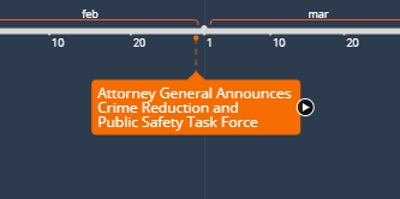3 Jun 2018 Jahr - Grand Junction Sheriff Transforms office, Changing approach from reactive to Problem Oriented Policing "micro hot spot policing," "intelligence-based policing," Daily Sentanel
Beschreibung:
Sheriff Matt Lewis is the first person to admit the agency he'd worked at for 22 years needed a new direction.After returning from training at the FBI National Academy about 18 months ago, he wanted to pursue a new strategy, an organizational change that would transform the way his agency diagnosed crime and dedicated resources toward fighting it. "We are in the crime business," Lewis said. "There is nothing that is more our responsibility than crime in this county, and we weren't doing a good job at it."
The agency had endured budget cuts, was short-staffed and wasn't able to be proactive or as service-oriented as he liked. For a year, he invested in developing the new organizational structure, obtaining buy-in and identifying barriers to the new culture. Using limited resources in a smarter way is one of the reasons Lewis wanted to initiate the new crime-fighting approach.
"We had become an organization where our specialty was showing up after you were a victim and documenting what happened to you," he said. "That was who we were, and today we are an organization of problem-solvers." Leadership at the Mesa County Sheriff's Office didn't like the trend of increasing crime and wanted to do something, too. "We were frustrated with what crime had done over the previous 10 years," Undersheriff Todd Rowell said.
Lewis got the idea for the organizational shift by combining techniques used by law enforcement. One is "micro hot spot policing," in which agencies identify sudden increases in types of crime and immediately jump on it to prevent a pattern from forming. Another is "intelligence-based policing," which focuses on mining crime data the department collects to notice trends and predict crime events when possible. Until this point, the Sheriff's Office hadn't regularly analyzed crime data, and it wasn't presented in a way that could easily be mined.
The department created a crime analyst position and enlisted the help of
Deputy Mark Johnson, who had a background
- in military intelligence
and felt comfortable
- analyzing data.
They started meeting once a week to interpret the numbers, with Johnson highlighting the crime data and the deputies assigned to the high-crime areas presenting to the group, which helped brainstorm possible solutions and resources to solve problems.
Many of the CRU's cases involve mental-health issues, drug addiction and poor living conditions. Some of them aren't outright criminal, they're not black and white, but they leech resources from the department because there's really no one else to deal with them. Sometimes these cases require unconventional solutions, and the reason they haven't been resolved is that just arresting people and putting them in jail temporarily hasn't fixed the problem. "It is our job to identify the underlying issues and to stop those issues," Lewis said.
When barriers to resolving those issues are found, the team's job is to overcome them.
https://www.gjsentinel.com/news/western_colorado/sheriff-transforms-office-changing-approach-from-reactive-to-proactive/article_44784b2e-66f1-11e8-b28e-10604b9f7e7c.html?fbclid=IwAR35m5Xu4U9vVj6SqwQcS8wAyZylvLc4QYnJWh7uVBetcO6yTo5cqvcUmo0
Zugefügt zum Band der Zeit:
Datum:
3 Jun 2018 Jahr
Jetzt
~ 7 years ago
